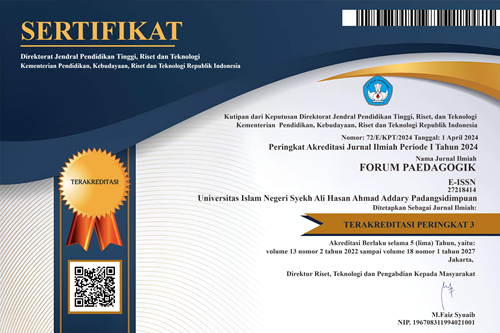PENINGKATAN HASIL BELAJAR BIOLOGI POKOK BAHASAN EKOSISTEM MELALUI MODEL PEMBELAJARAN KOOPERATIF TIPE STAD
Abstract
The result of students’ learning biology in grade X-U 5 MAN 2 Padangsidimpuan haven’t gratified yet. From the experience of the researcher, students always feel difficult in comprehending of ecosystem material. This is caused by using method that is not related. This research has aim to improve students’ biology mastery through STAD Strategy. It is specified in ecosystem material. Formulation of the problem of this research is “to what extend STAD strategy can improve students’ biology mastery at grade X-U 5 MAN 2 Padangsidimpuan”. The kind of this research is action class room research (CAR) with two cycle. In each cycle consist of four step; planning, action, observation, and reflection. Informant of this research is students in X-U 5 grade with total of students are twenty five students. Data in this research is collecting through observation, interview, and test. Technique of collecting data use descriptive analysis.
The result of this research shows that STAD strategy in ecosystem material can improve students’ biology mastery in X-U 5 grade of MAN 2 Padngsidimpuan. The mean of the students’ biology result can get 83,69 and percentage of students can get standardized in 88% from KKM.
Key Word: STAD Strategy, result of learning.
The result of students’ learning biology in grade X-U 5 MAN 2 Padangsidimpuan haven’t gratified yet. From the experience of the researcher, students always feel difficult in comprehending of ecosystem material. This is caused by using method that is not related. This research has aim to improve students’ biology mastery through STAD Strategy. It is specified in ecosystem material. Formulation of the problem of this research is “to what extend STAD strategy can improve students’ biology mastery at grade X-U 5 MAN 2 Padangsidimpuan”. The kind of this research is action class room research (CAR) with two cycle. In each cycle consist of four step; planning, action, observation, and reflection. Informant of this research is students in X-U 5 grade with total of students are twenty five students. Data in this research is collecting through observation, interview, and test. Technique of collecting data use descriptive analysis.
The result of this research shows that STAD strategy in ecosystem material can improve students’ biology mastery in X-U 5 grade of MAN 2 Padngsidimpuan. The mean of the students’ biology result can get 83,69 and percentage of students can get standardized in 88% from KKM.
Key Word: STAD Strategy, result of learning.
- DAFTAR PUSTAKA
- Arikunto, Suharsimi, Suharjono dan Supardi. (2008). Penelitian Tindakan Kelas. Jakarta: Bumi Aksara.
- Arikunto, Suharsimi. (2006). Dasar-dasar Evaluasi Pendidikan. Jakarta: Bumi Aksara.
- Asma, Nur. (2008). Model Pembelajaran Kooperatif. Padang: UNP Press.
- Dahar, R.W. 1988. Teori-teori Belajar. Jakarta: Depdikbud.
- Depdiknas. (2004). Kamus Besar Bahasa Indonesia. Jakarta: Balai Pustaka.
- Dimyati dan Mudjiono. (1999). Belajar dan Pembelajaran. Jakarta: Rineka Cipta.
- Eggen, P. D. & Kauchak D. P. (1998). Learning and Teaching: Research-Based Methods. Boston: Allyn and Bacon.
- Gagne, Robert M. (1975). Prinsip-Prinsip Belajar Untuk Pengajaran. Terjemahan oleh Abdillah Hanafi dan Abdul Manan. 1988. Surabaya: Usaha Nasional.
- Hudoyo, Herman. (1988). Mengajar Belajar Matematika. Jakarta: Proyek Pengembangan LPTK Depdikbud.
- Lie, Anita. (2002). Cooperative Learning: Mempraktikkan Cooperative Learning di Ruang-Ruang Kelas. Jakarta: Grasindo.
- Lufri. 2007. Kiat Memahami Metodologi dan Melakukan Penelitian. Padang: Jurusan Biologi FMIPA Universitas Negeri Padang.
- Nasution, S.(1982). Berbagai Pendekatan dalam Proses belajar Mengajar. Edisi Pertama. Jakarta: Bina Aksara
- Nur, Mohamad. (2005). Pembelajaran Kooperatif. Surabaya : Unesa.
- Pannen, P., Mustafa, D. dan Sekarwinahyu. (2001). Konstruktivisme dalam Pembelajaran. Jakarta: Depdiknas.
- Pemerintah R.I. (2004). Undang-Undang Sistem Pendidikan Nasional Nomor 20 Tahun 2003. Jakarta: Depdiknas.
- Sardiman, A.M. (2006). Interaksi & Motivasi Belajar Mengajar. Jakarta : PT. Raja grafindo Persada.
- Silberman. (1996). Active Learning 101 Cara Belajar Peserta didik Aktif. Terjemahan oleh Raisul Muttaqien. 2006. Bandung: Nusamedia.
- Slavin, Robert E. (1995). Cooperative Learning Theory, Research, and Practice. Massachusetts: Allyn and Bacon.
- Suradi. (2005). ”Menfasilitasi Siswa dalam Belajar Matematika Melalui Pembelajaran Kooperatif Tipe STAD”. Jurnal Pembelajaran, 2 (28): 130.
- Wardani, I.G.A.K. (2005). Penelitian Tindakan Kelas. Jakarta: Universitas Terbuka.
 Copyright (c) 2015 LIsnawati Sitompul
Copyright (c) 2015 LIsnawati Sitompul

This work is licensed under a Creative Commons Attribution-ShareAlike 4.0 International License.











